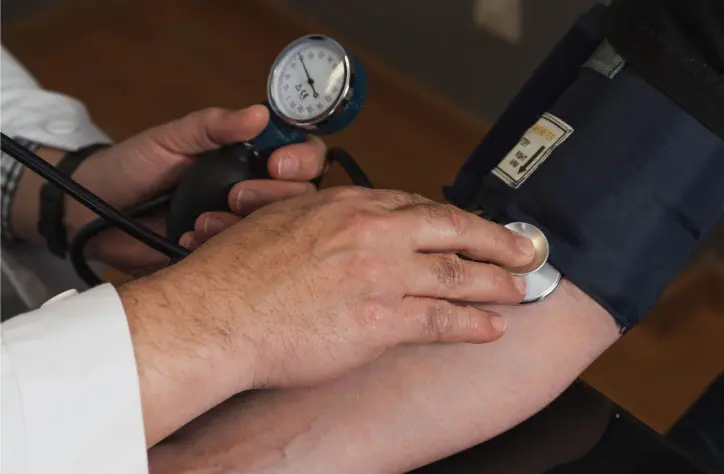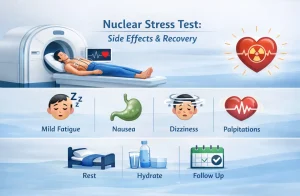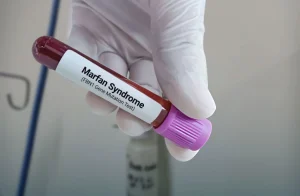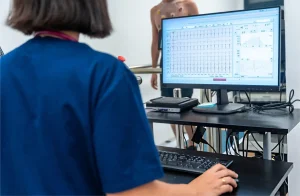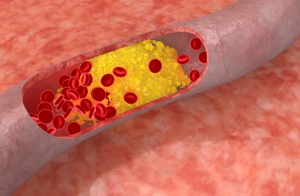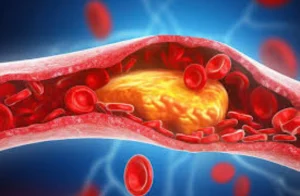High blood pressure, or hypertension, is a common health concern, often called the “silent killer” because it can cause serious damage without obvious symptoms. But there’s a far more dangerous form of hypertension – malignant hypertension. This condition isn’t just about elevated numbers on a blood pressure monitor; it’s a medical emergency demanding immediate attention.
In this blog post, we’ll take a closer look at malignant hypertension. We’ll discuss what it is, the risks it poses, the signs to watch out for, and the crucial steps to manage this condition effectively. Whether you’re dealing with high blood pressure yourself or simply want to be informed, understanding malignant hypertension is essential for safeguarding your health.
What Is Malignant Hypertension?
Malignant hypertension is a severe and potentially life-threatening form of high blood pressure. It’s characterized by a sudden and dramatic increase in blood pressure, often accompanied by damage to vital organs like the kidneys, brain, and eyes.
Studies show malignant hypertension affects about 1% of people with high blood pressure. That might seem like a small number, but it translates to a significant public health concern.
Warning: If you suspect you might have malignant hypertension, it’s crucial to seek immediate medical attention. Call emergency services or proceed directly to the nearest emergency department. For expert consultation and care, consider contacting the Atlantic Cardiovascular Consultants cardiologists.
How High Is Blood Pressure to Be Called Malignant Hypertension?
While we often hear about ‘normal’ blood pressure being around 120/80 mmHg, malignant hypertension throws those numbers out the window. It’s diagnosed when your blood pressure skyrockets to extremely high levels, typically a systolic blood pressure (the top number) of 180 mmHg or higher, or a diastolic blood pressure (the bottom number) of 120 mmHg or higher.
Types of Malignant Hypertension
While malignant hypertension is itself a severe form of high blood pressure, it can further be classified into two main types:
1- Hypertensive Emergency:
This is the most critical and urgent type of malignant hypertension. It’s characterized by extremely high blood pressure accompanied by evidence of immediate and ongoing damage to vital organs.
This damage can manifest as symptoms like severe headache, vision problems, chest pain, shortness of breath, and confusion. A hypertensive emergency is a medical emergency requiring immediate hospitalization and aggressive treatment to prevent life-threatening complications
2- Hypertensive Urgency:
In this type, blood pressure is also severely elevated, but there’s no clear evidence of immediate organ damage. However, hypertensive urgency still requires prompt medical attention as it can quickly progress to a hypertensive emergency if left untreated.
Prevent heart problems before they start – Schedule a preventive checkup
Contact UsWhat are the First Signs of Malignant Hypertension
Malignant hypertension is often described as a “medical emergency” because it can cause rapid and severe damage to your body. Recognizing the early warning signs is critical to getting prompt treatment and potentially saving your life. Here are some of the initial symptoms that might indicate malignant hypertension:
- Pounding Headache: This is often the first and most prominent symptom. It’s typically described as a severe, throbbing headache that might be accompanied by nausea and vomiting.
- Vision Problems: You might experience blurred or double vision, or even temporary loss of sight. This is due to the high blood pressure affecting the blood vessels in your eyes.
- Shortness of Breath: The increased pressure can strain your heart and lungs, leading to difficulty breathing, even when resting.
- Chest Pain: This can be a sign that the high blood pressure is affecting your heart.
- Confusion or Altered Mental State: The brain is highly sensitive to changes in blood pressure, and malignant hypertension can cause confusion, disorientation, or even seizures.
- Nausea and Vomiting: These symptoms often accompany the severe headache.
- Decreased Urine Output: The kidneys are another organ vulnerable to the effects of high blood pressure. Malignant hypertension can lead to reduced urine production or even complete kidney failure.
Causes Behind Malignant Hypertension
Malignant hypertension doesn’t just happen out of the blue. It’s usually triggered by a combination of factors, often in people who already have a history of high blood pressure. Let’s explore some of the most common causes:
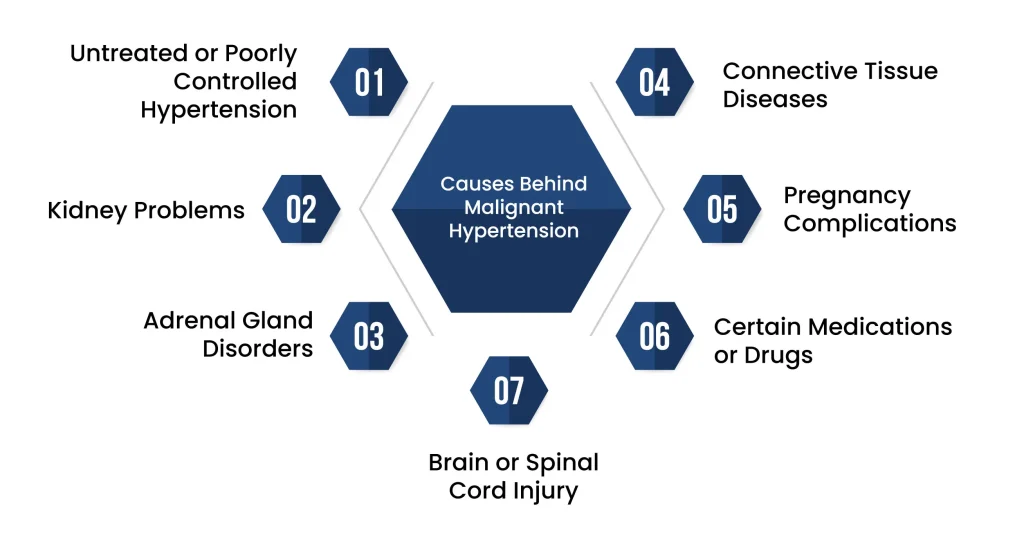
- Untreated or Poorly Controlled Hypertension: This is the biggest risk factor. If you have high blood pressure and aren’t managing it effectively with medication or lifestyle changes, it can escalate into malignant hypertension.
- Kidney Problems: Your kidneys play a crucial role in regulating blood pressure. Kidney diseases or damage can disrupt this balance and lead to severe hypertension.
- Adrenal Gland Disorders: These glands produce hormones that influence blood pressure. Conditions like Cushing’s syndrome or pheochromocytoma can cause excessive hormone production, triggering malignant hypertension.
- Connective Tissue Diseases: Diseases like scleroderma and lupus can affect the blood vessels and lead to high blood pressure complications.
- Pregnancy Complications: Preeclampsia, a condition characterized by high blood pressure during pregnancy, can sometimes progress to malignant hypertension.
- Certain Medications or Drugs: Some medications, illicit drugs (like cocaine), or even the abrupt stopping of certain blood pressure medications can trigger a hypertensive crisis.
- Brain or Spinal Cord Injury: These injuries can disrupt the nervous system’s control of blood pressure, potentially leading to malignant hypertension.
How Will Your Cardiologists Diagnose Malignant Hypertension?
Diagnosing malignant hypertension is a multifaceted process involving both clinical assessment and diagnostic tests. Here’s how your cardiologist might proceed:
- Detailed Medical History & Physical Examination: Your doctor will begin by asking about your symptoms, current medications, any history of high blood pressure, and other underlying health conditions. A thorough physical examination, including multiple blood pressure readings in both arms, will be performed.
- Eye Exam: A comprehensive eye exam is critical to look for signs of damage to the blood vessels in the retina, which can indicate the severity of the hypertension and its impact on your organs.
- Blood Tests: These will check for signs of organ damage, particularly to the kidneys, heart, and liver. Tests may include measuring blood urea nitrogen (BUN) and creatinine levels (for kidney function), cardiac enzymes (for heart damage), and electrolytes.
- Urine Tests: A urinalysis can detect protein or blood in the urine, which could suggest kidney damage.
- Electrocardiogram (EKG): This test records the electrical activity of your heart and can reveal any signs of strain or damage due to the high blood pressure.
- Chest X-ray: This helps assess the size and shape of your heart, as well as check for fluid in the lungs (a potential complication of heart failure).
- Other Imaging Tests: Depending on your symptoms and clinical findings, additional imaging tests like a CT scan or MRI might be ordered to evaluate potential damage to the brain, kidneys, or other organs.
Diagnosing malignant hypertension often requires a combination of these tests. Your cardiologist will carefully review the results to determine the severity of your condition and recommend the most appropriate treatment plan.
Words By Author
In conclusion, malignant hypertension is a medical emergency requiring immediate attention. Recognizing the signs and understanding the risks can be lifesaving. If you’re concerned about high blood pressure or experience any of the symptoms discussed here, don’t hesitate to seek medical advice.
Remember, with prompt diagnosis and treatment, the outlook for individuals with malignant hypertension has significantly improved. At Atlantic Cardiovascular Consultants, our team of experienced cardiologists is dedicated to providing comprehensive care for all forms of hypertension, including malignant hypertension.

